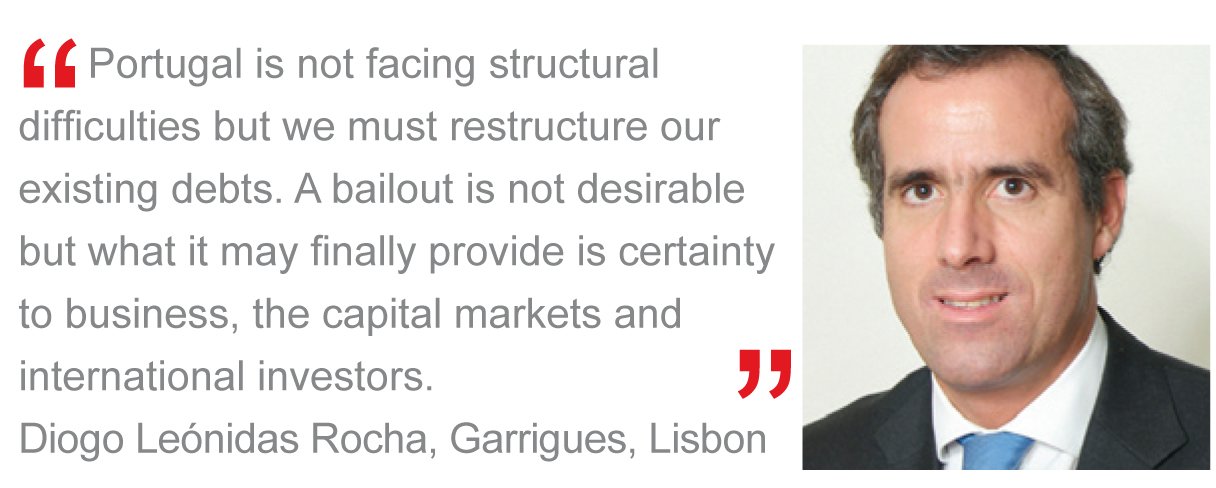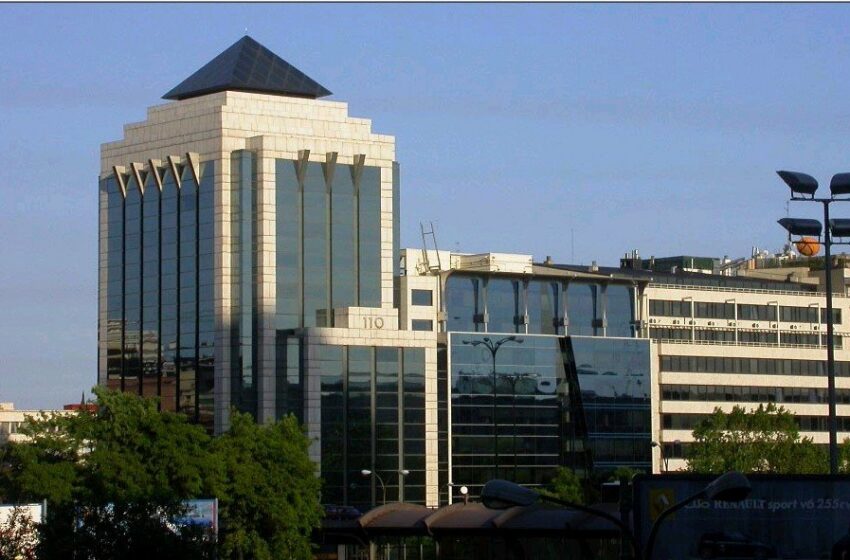Magicians required
The prospective bailout of Portugal by the “troika” of the European Union (EU), European Community Bank (ECB) and IMF (International Monetary Fund) may not be cause for celebration but it at least brings certainty to the country’s finances, say lawyers in Lisbon. It requires however the newly elected Social Democratic-led Government of Pedro Passos Coelho to complete an ambitious trick, to overcome vested business and political interests and achieve a dramatic financial turnaround.
Puede que el rescate de Portugal no sea un motivo de celebración, pero al menos aporta certeza respecto a las finanzas del país. Sin embargo, el Gobierno Social-Demócrata recién electo de Pedro Passos Coelho deberá realizar un ambicioso truco de magia para cambiar drásticamente la economía.
The demands of the EU, ECB and IMF may be unpalatable but they nonetheless present an unprecedented investment opportunity, say lawyers in Lisbon, many of whom expect to be deeply involved in the reform process.
“One cannot help but be stunned by some comments that this is good news for Portugal but clearly we could not go on as we were”, says Manuel Santos Vítor, co-Managing Partner of PLMJ. “Many of the remedial measures contemplated had however previously proved politically unattractive.”
There is no doubt that the proposals, which include a restructuring of the financial system, the sale of the Government’s “golden shares” in key companies, a wave of privatisations and significant changes to tax, labour and redundancy rules, have the potential to make a significant difference to the state finances, say lawyers. But questions remain around where any new investment will come from and the willingness of the country’s business and political elite to embrace the necessary change.
The status quo
Following Greece and Ireland, Portugal has become the third Eurozone country to seek a financial rescue package since the onset of the global financial crisis in 2007. Lawyers in Lisbon insist however that Portugal’s troubles are neither the result of over-stated public finances nor a systemic banking failure, as was the case with Greece and Ireland respectively, but instead a lack of fiscal efficiency and competitiveness.
“Portugal is not facing structural difficulties but we must restructure our existing debts. A bailout is not desirable but what it may finally provide is certainty to business, the capital markets and international investors,” says Diogo Leónidas, corporate Partner with Garrigues in Lisbon, which is advising the IMF.
Since the middle of last year, the minority socialist Government of Prime Minister José Sócrates had proved increasingly unable to raise new sovereign debt as a result of rising bond yields, and to push through further austerity measures. By the end of 2010 the national deficit had reached 93 percent of GDP (comparable to Ireland’s 96 percent but significantly lower than Greece’s 142 percent). The budget deficit had fallen to 9.3 percent (from 10.1 percent in 2009) but still a long way off the target 4.6 percent for 2011, with the economy expected to shrink a further 1.5-2 percent over this year. The resignation of Sócrates at the end of March, after the failure to win a key Parliamentary vote for a fourth austerity budget, finally prompted a request for outside financial assistance.
“We had reached a point where the domestic banks were unable to add further liquidity and had stopped buying Government debt, which itself had trouble paying its own bills,” says Santos Vítor.
The EU, ECB and IMF quickly stepped in, working with a caretaker Government – ahead of the elections on June 5th – on a three-year package worth €78bn, equivalent to 45 percent of GDP.
“Nobody wished for the current situation but we do now have an economic recovery plan. Businesses need though to assess what lies ahead, to adapt to the changes or to capitalise on any new opportunities presented,” says Jorge Santiago Neves, Partner with Gómez-Acebo & Pombo in Lisbon.
“Over the next two years we are likely to see the largest fiscal restructuring Portugal has ever experienced, but if executed properly the country and its major businesses should emerge in a far better shape. For those that see Portugal as strategically important it presents an almost once in a lifetime opportunity.”
 Memorandum
Memorandum
A Memorandum of Undertaking (MoU) drafted by the EU, ECB and IMF and agreed by all Portugal’s major political parties ahead of the Parliamentary elections presents an outline of what needs to be done if the country is to receive the €78bn pledged.
“The Memorandum is no quick fix for Portugal’s problems. It proposes deep-rooted structural economic and legal changes that will have a huge impact on the country,” says Pedro Guimarães, Partner with F Castelo Branco & Associados (FCB&A) in Lisbon. “It sets out the necessary albeit ‘very difficult’ decisions that our own politicians had previously been afraid or unwilling to commit to.”
The MoU stipulates a requirement to privatise a number of major Portuguese companies, recapitalise and restructure the banking system, renegotiate public works projects, and change aspects of the tax, court and labour law systems. The Government deficit must drop to 5.9 percent in 2011, 4.5 percent in 2012 and 3 percent in 2013 to increase efficiency and national competitiveness.
“There is a lot to be done and in a relatively short time. The Government clearly needs to focus on specific goals. Considering that disbursements are subject to a quarterly assessment of the level of implementation, if the milestones are not met then we risk that further funds will not be forthcoming,” says Maria João Ricou, co-Managing Partner at Cuatrecasas Gonçalves Pereira & Associados in Lisbon.
A key aim is to “preserve financial sector stability, maintain liquidity and support a balanced and orderly deleveraging of the banking sector.” This includes the sale of the nationalised Banco Portugues de Negocios without a minimum price, by the end of July 2011, and to streamline the state-owned Caixa Geral de Depósitos – through the sale of its insurance arm and non-subsidiary operations, and a potential reduction of international operations.
Portuguese banks have until the end of June 2011 to present medium-term funding plans, while the Bank of Portugal will impose a nine percent tier one capital ratio by the end of the year, rising to ten percent in 2012. €12bn will be made available to refinance the banks as part of a €35bn issue of Government backed bank bonds – although any banks benefiting from equity injections will need to meet specific management commitments, with a general rise in banking scrutiny and stress testing.
“We see the prospect of significant new rights issues, restructurings and M&A activity. This may be high profile but the Government, like the banks, are committed to cost cutting and there is no room for generous fee agreements in any of this,” notes Leónidas at Garrigues.
Privatisation
The Portuguese Government has already announced the cancellation or delay of major infrastructure spending but the MoU stipulates a moratorium on any new public-private partnerships (PPPs) and a reassessment, and potential renegotiation, of the 20 most significant ongoing PPP and concession agreements.
Such proposals may worry some while others are looking more positively on the reform process, report lawyers. Significant will be the way the Government looks to accelerate its privatisation plans, to raise an expected €5.5bn. Among the sectors in the spotlight include transport and communications, the airports operator ANA (Aeroportos de Portugal) and state airline TAP are scheduled for sale, as potentially is the state railway operator CP.
In the energy sector, the Government’s holdings in companies such as Galp, EdP and REN are to be sold, while there also exists the potential to review existing renewable energy feed-in tariffs. Much of this is expected to be in progress by the end of the year.
“The mere fact that the Government is to give up its ‘golden shares’ in these companies will likely mean an increase in their value, while the forced divestiture of non-core businesses by the banks, opens up a significant number of opportunities on the small, medium and large-scale,” says Miguel Castro Pereira, Managing Partner of Abreu Advogados.
Companies such as Gas de France and Brazil’s Petrobras have reportedly already shown renewed interest in Portugal, while Brazilian airline TAM and Iberia/British Airways have been linked to the sale of TAP. But it is Spanish banks and businesses, as the biggest foreign investors in Portugal, that have the most to gain or lose from the plans, say some.
“In many of these sectors there is no existing domestic alternative and we already sense foreign companies exploring options, either to take over Portuguese companies or at least to establish some form of local joint venture,” says Guimarães at FCB&A.
Justice is also an area of reform emphasis as is the legal profession itself. The paralysis of the courts is a significant barrier to the timely enforcement of disputes states the MoU – with greater alternative dispute resolution methods proposed – while law firms should have greater freedom to promote themselves.
Lawyers question however whether the Government will find sufficient resources to recruit and train new judges and to reinforce regulatory institutions such as the national competition authority (AdC). The election of a new Government is therefore just one step in a process that will require a lot of rabbits to be pulled from the same hat, say some.
For the country’s law firms, the next 18-24 months may yet however deliver unprecedented new business and client opportunities but few are taking anything for granted.
“We see the potential for a lot of legal work and while our goal would be to play a major role in one of the most significant transactions this year we’re not yet planning our budgets around any aspect of the process,” says Leónidas at Garrigues.
A significant issue for much of Portugal’s legal market may however be that though some law firms may see a short term boom in demand, the economy is not likely to return to growth for a number of years. If the Government and the troika can perform what is expected of them Portugal may emerge from the downturn in a healthier position, the same is not however guaranteed for all its law firms.
Subscribe now to receive your copy of Iberian Lawyer












